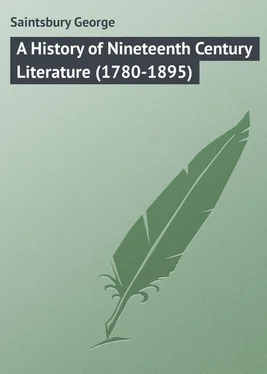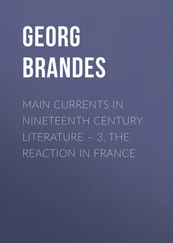George Saintsbury - A History of Nineteenth Century Literature (1780-1895)
Здесь есть возможность читать онлайн «George Saintsbury - A History of Nineteenth Century Literature (1780-1895)» — ознакомительный отрывок электронной книги совершенно бесплатно, а после прочтения отрывка купить полную версию. В некоторых случаях можно слушать аудио, скачать через торрент в формате fb2 и присутствует краткое содержание. ISBN: , Жанр: foreign_prose, на английском языке. Описание произведения, (предисловие) а так же отзывы посетителей доступны на портале библиотеки ЛибКат.
- Название:A History of Nineteenth Century Literature (1780-1895)
- Автор:
- Жанр:
- Год:неизвестен
- ISBN:http://www.gutenberg.org/ebooks/31698
- Рейтинг книги:5 / 5. Голосов: 1
-
Избранное:Добавить в избранное
- Отзывы:
-
Ваша оценка:
- 100
- 1
- 2
- 3
- 4
- 5
A History of Nineteenth Century Literature (1780-1895): краткое содержание, описание и аннотация
Предлагаем к чтению аннотацию, описание, краткое содержание или предисловие (зависит от того, что написал сам автор книги «A History of Nineteenth Century Literature (1780-1895)»). Если вы не нашли необходимую информацию о книге — напишите в комментариях, мы постараемся отыскать её.
A History of Nineteenth Century Literature (1780-1895) — читать онлайн ознакомительный отрывок
Ниже представлен текст книги, разбитый по страницам. Система сохранения места последней прочитанной страницы, позволяет с удобством читать онлайн бесплатно книгу «A History of Nineteenth Century Literature (1780-1895)», без необходимости каждый раз заново искать на чём Вы остановились. Поставьте закладку, и сможете в любой момент перейти на страницу, на которой закончили чтение.
Интервал:
Закладка:
Of his character not much need be said. Like that of Milton, whom he in many ways resembled (they had even both, as Hartley Coleridge has pointed out, brothers named Christopher), it was not wholly amiable, and the defects in it were no doubt aggravated by his early condition (for it must be remembered that till he was two and thirty his prospects were of the most disquieting character), by the unjust opposition which the rise of his reputation met with, and by his solitary life in contact only with worshipping friends and connections. One of these very worshippers confesses that he was "inhumanly arrogant"; and he was also, what all arrogant men are not, rude. He was entirely self-centred, and his own circle of interests and tastes was not wide. It is said that he would cut books with a buttery knife, and after that it is probably unnecessary to say any more, for the fact "surprises by itself" an indictment of almost infinite counts.
But his genius is not so easily despatched. I have said that it is now as a whole universally recognised, and I cannot but think that Mr. Matthew Arnold was wrong when he gave a contrary opinion some fifteen years ago. He must have been biassed by his own remembrance of earlier years, when Wordsworth was still a bone of contention. I should say that never since I myself was an undergraduate, that is to say, for the last thirty years, has there been any dispute among Englishmen whose opinion was worth taking, and who cared for poetry at all, on the general merits of Wordsworth. But this agreement is compatible with a vast amount of disagreement in detail; and Mr. Arnold's own estimate, as where he compares Wordsworth with Molière (who was not a poet at all, though he sometimes wrote very tolerable verse), weighs him with poets of the second class like Gray and Manzoni, and finally admits him for his dealings with "life," introduces fresh puzzlements into the valuation. There is only one principle on which that valuation can properly proceed, and this is the question, "Is the poet rich in essentially poetical moments of the highest power and kind?" And by poetical moments I mean those instances of expression which, no matter what their subject, their intention, or their context may be, cause instantaneously in the fit reader a poetical impression of the intensest and most moving quality.
Let us consider the matter from this point of view. 4 4 It must be remembered that Wordsworth was a prose writer of considerable excellence and of no small volume. Many people no doubt were surprised when Dr. Grosart, by collecting his pamphlets, his essays, his notes, and his letters, managed to fill three large octavo volumes. But his poetry so far outweighs his prose (though, like most poets, he could write admirably in his pedestrian style when he chose) that his utterances in "the other harmony" need not be specially considered. The two most considerable examples of this prose are the pamphlet on The Convention of Cintra and the five and twenty years later Guide to the Lakes . But minor essays, letters of a more or less formal character, and prefaces and notes to the poems, make up a goodly total; and always display a genius germane to that of the poems.
The chief poetical influences under which Wordsworth began to write appear to have been those of Burns and Milton; both were upon him to the last, and both did him harm as well as good. It was probably in direct imitation of Burns, as well as in direct opposition to the prevailing habits of the eighteenth century, that he conceived the theory of poetic diction which he defended in prose and exemplified in verse. The chief point of this theory was the use of the simplest and most familiar language, and the double fallacy is sufficiently obvious. Wordsworth forgot that the reason why the poetic diction of the three preceding generations had become loathsome was precisely this, that it had become familiar; while the familiar Scots of Burns was in itself unfamiliar to the English ear. On the other hand, he borrowed from Milton, and used more and more as he grew older, a distinctly stiff and unvernacular form of poetic diction itself. Few except extreme and hopeless Wordsworthians now deny that the result of his attempts at simple language was and is far more ludicrous than touching. The wonderful Affliction of Margaret does not draw its power from the neglect of poetic diction, but from the intensity of emotion which would carry off almost any diction, simple or affected; while on the other hand such pieces as "We are Seven," as the "Anecdote for Fathers," and as "Alice Fell," not to mention "Betty Foy" and others, which specially infuriated Wordsworth's own contemporaries, certainly gain nothing from their namby-pamby dialect, and sometimes go near to losing the beauty that really is in them by dint of it. Moreover, the Miltonic blank verse and sonnets – at their best of a stately magnificence surpassed by no poet – have a tendency to become heavy and even dull when the poetic fire fails to fuse and shine through them. In fact it may be said of Wordsworth, as of most poets with theories, that his theories helped him very little, and sometimes hindered him a great deal.
His real poetical merits are threefold, and lie first in the inexplicable, the ultimate, felicity of phrase which all great poets must have, and which only great poets have; secondly, in his matchless power of delineating natural objects; and lastly, more properly, and with most special rarity of all, in the half-pantheistic mysticism which always lies behind this observation, and which every now and then breaks through it, puts it, as mere observation, aside, and blazes in unmasked fire of rapture. The summits of Wordsworth's poetry, the "Lines Written at Tintern Abbey" and the "Ode on Intimations of Immortality," – poems of such astonishing magnificence that it is only more astonishing that any one should have read them and failed to see what a poet had come before the world, – are the greatest of many of these revelations or inspirations. It is indeed necessary to read Wordsworth straight through – a proceeding which requires that the reader shall be in good literary training, but is then feasible, profitable, and even pleasant enough – to discern the enormous height at which the great Ode stands above its author's other work. The Tintern Abbey lines certainly approach it nearest: many smaller things – "The Affliction of Margaret," "The Daffodils," and others – group well under its shadow, and innumerable passages and even single lines, such as that which all good critics have noted as lightening the darkness of the Prelude —
Voyaging through strange seas of thought, alone —
must of course be added to the poet's credit. But the Ode remains not merely the greatest, but the one really, dazzlingly, supremely great thing he ever did. Its theory has been scorned or impugned by some; parts of it have even been called nonsense by critics of weight. But, sound or unsound, sense or nonsense, it is poetry, and magnificent poetry, from the first line to the last – poetry than which there is none better in any language, poetry such as there is not perhaps more than a small volume-full in all languages. The second class of merit, that of vivid observation, abounds whereever the poems are opened. But the examples of the first are chiefly found in the lyrics "My Heart Leaps up," "The Sparrow's Nest"; the famous daffodil poem which Jeffrey thought "stuff," which some say Dorothy wrote chiefly, and which is almost perfect of its kind; the splendid opening of the "Lines to Hartley Coleridge," which connect themselves with the "Immortality Ode"; the exquisite group of the "Cuckoo," the best patches of the Burns poems, and the three "Yarrows"; the "Peel Castle" stanzas; and, to cut a tedious catalogue short, the hideously named but in parts perfectly beautiful "Effusion on the Death of James Hogg," the last really masterly thing that the poet did. In some of these we may care little for the poem as a whole, nothing for the moral the poet wishes to draw. But the poetic moments seize us, the poetic flash dazzles our eyes, and the whole divine despair or not more divine rapture which poetry causes comes upon us.
Читать дальшеИнтервал:
Закладка:
Похожие книги на «A History of Nineteenth Century Literature (1780-1895)»
Представляем Вашему вниманию похожие книги на «A History of Nineteenth Century Literature (1780-1895)» списком для выбора. Мы отобрали схожую по названию и смыслу литературу в надежде предоставить читателям больше вариантов отыскать новые, интересные, ещё непрочитанные произведения.
Обсуждение, отзывы о книге «A History of Nineteenth Century Literature (1780-1895)» и просто собственные мнения читателей. Оставьте ваши комментарии, напишите, что Вы думаете о произведении, его смысле или главных героях. Укажите что конкретно понравилось, а что нет, и почему Вы так считаете.












